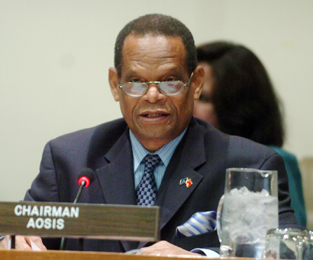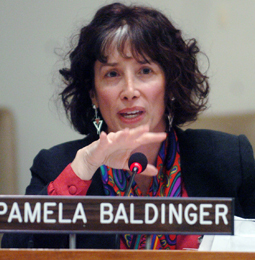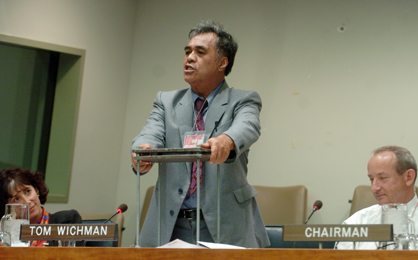|

 |
|
|
|
Fourteenth
Session of the Commission on Sustainable Development
(CSD-14)
1-12
May 2006 | United Nations Headquarters, New York
|
Highlights for Monday, 8 May 2006 |
|
|
|

|
|
Anwarul K Chowdhury, UN Under-Secretary-General and High Representative for the Least Developed Countries (left), called on the CSD to review implementation of the Mauritius Strategy each year and on the UN Inter-Agency Task Force (IATF) to develop a set of indicators to monitor progress. He emphasized the role of international financial institutions and noted recent discussions on insurance and emergency relief funding.
Patrizio Civili, Assistant Secretary-General for Policy Coordination and Interagency Affairs, DESA (right),noted that oil imports consume a large percentage of SIDS earnings, underlining the need for the development and expansion of affordable, accessible and renewable energy services as a contribution to reduced vulnerability. He also noted the importance of promoting competitive industries.
|
| Panel Discussion:
Energy access and efficiency and renewable energy |
| Kassiap Deepchand, Mauritius Sugar Authority, outlined successful reforms carried out in the bagasse energy sector in Mauritius by way of close collaboration between the government, private sector and farmers, saving the equivalent of 200,000 tons of coal.
Basil Sutherland, Caribbean Electric Utilities Services Corporation, Saint Lucia (right), examined the impact of different policy options, noting that privatization of electric utilities has resulted in improved customer service but failed to lower electricity prices, and said energy diversification is critical to SIDS.
|
Cuba noted that ODA to SIDS has been reduced by more than 50 percent and emphasized SIDS-to-SIDS experience sharing. |
| Highlighting continuing commitment to SIDS,
Irene Freudenschuss, Austria, speaking for the EU, noted new financial instruments being developed for EU-SIDS cooperation and funding for over six thousand SIDS projects since 2000. CSD Vice-Chair Javad Amin-Mansour, Iran, reads IISD's MEA Bulletin |
| Panel Discussion: Industrial development in Small Island Developing States: |
 |
|
|
| Pamela Baldinger, USAID (left), discussed energy efficiency in the Dominican Republic's tourism industry, highlighting hotel sector lessons such as the need to integrate energy and water conservation, to establish programme champions, and to develop context specific case studies. Atina Myazoe, Ministry of Resources and Development, Marshall Islands (center), highlighted energy service initiatives to increase socio-economic conditions in the outer islands, discussing stand alone solar home systems, substituting coconut oil for diesel, and the use of solar freezers. Carlos Echeverria, Inter-American Institute for Cooperation in Agriculture (IICA) (right), discussed efforts in support of agro-tourism, including, inter alia , efforts to link rural communities with hotels and tourism associations, developing pilot projects, and linking with intergovernmental institutions such as the Pan American Health Association (PAHO) on water quality issues. |
| 
|
Tom Wichman, GHG and Energy Consultant, Cook Islands (above), underlined issues of technology transfer such as consultants selling out of date technology and governments and inter-governmental organizations providing flawed assistance. He illustrated locally developed solutions including a water treatment unit, a coconut oil extractor, and refrigerator efficiency gains.
|
| Panel Discussion:
Atmospheric pollution and adaptation to climate change |
| Leslie Walling, Caribben Conservation Association (left), called for the institutionalization of available adaptation measures, including traditional methods, in anticipation of climatic change. He said a study by the University of the West Indies indicated that a warming pattern that will precipitate intense storms with exponential impacts. He cited the adoption of risk assessment in farming, and the role of the insurance industry in institutionalizing risk reduction. Albert Binger, University of the West Indies Centre for Environment and Development (right), noted that SIDS could satisfy nearly 50 percent of their diesel requirement if they were to dedicate between ten and fifteen percent of land to growing biofuels. He added that this would also result in significant savings in foreign exchange. |
|
|
|
|
|
|
|
|
| |
|
 Please
e-mail the
Digital Editor if
you have any questions regarding the content of this
page. Please
e-mail the
Digital Editor if
you have any questions regarding the content of this
page.
| Back to
Linkages home | Visit
IISDnet | Send e-mail to
ENB |
© 2006, IISD. All rights reserved. |
|
|
|